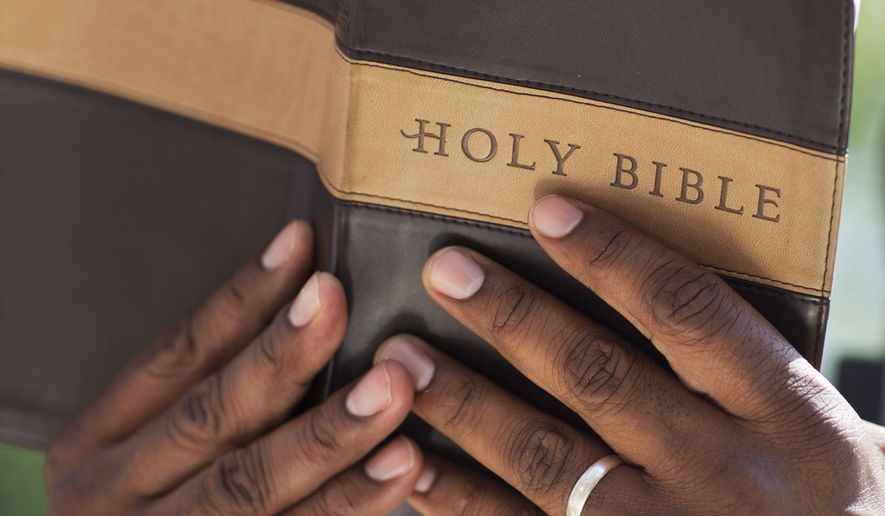The highest U.S. military court has upheld the bad conduct discharge of a Marine who refused to remove Bible verses from her workstation.
In a 4-1 decision handed down Wednesday, the U.S. Court of Appeals for the Armed Forces said the Religious Freedom Restoration Act does not apply to the case of former Cpl. Monifa Sterling, who was court-martialed and convicted of six offenses stemming from her noncompliance.
Kelly Shackelford, president of the First Liberty Institute, which represents Ms. Sterling, called the ruling “absolutely outrageous.”
“A few judges decided they could strip a Marine of her constitutional rights just because they didn’t think her beliefs were important enough to be protected,” Mr. Shackelford said in a statement. “If they can court-martial a Marine over a Bible verse, what’s to stop them from punishing service members for reading the Bible, talking about their faith, or praying?”
Ms. Sterling was court-martialed in 2014 after she refused to take down three handmade placards inscribed with various Bible verses, including Isaiah 54:17, which reads, “No weapon formed against you shall prosper.” Her supervisor ordered Ms. Sterling to take down the Bible verses and remarked that she “didn’t like [their] tone.”
Believing the First Amendment protected her right to display Scripture, Ms. Sterling kept the signs posted. The next morning, she found them in the trash. Rather than confronting her supervisor, Ms. Sterling reprinted the verses and reposted them around her workstation. She was court-martialed soon thereafter.
The appellate court’s majority opinion said Ms. Sterling failed to exhaust available channels to resolve the dispute, such as notifying her superiors of the religious nature of the Bible verses and seeking a formal accommodation, thereby leaving the Religious Freedom Restoration Act dormant on the matter. The court also said Ms. Sterling’s complaint failed to meet the “substantial burden” standard that the act requires.
Mikey Weinstein, founder of the Military Religious Freedom Foundation, which filed an amicus brief in the case, praised the decision as a win for good order and morale.
He pointed to the 1974 Supreme Court opinion in Parker v. Levy, which upheld a court-martial against an Army physician who encouraged service members to disobey orders as a protest of the Vietnam War. Military imperatives to create the most lethal fighting force, the court said in Parker, took precedent over the individual rights of service members.
The military appellate court cited Parker v. Levy in its decision Wednesday.
“The compelling governmental interest is different,” Mr. Weinstein said. “It’s to maximize good order, morale and unit cohesion.”
Calling the decision a new weapon in the fight over religiosity in the armed forces, Mr. Weinstein said he had received calls from six prospective clients from four branches of service. He said the case will have “humongous ramifications” in how religious disputes are litigated in the military.
“With superiors that want to display biblical citations in their military office space, in a tank, on a military airplane, have Bibles on their desks — I can’t say with enough fortitude how important this decision is,” he said.
Ken Klukowski, senior counsel and director of strategic affairs at First Liberty Institute, said the court simply “got the law wrong” on two counts.
First, he said, the Religious Freedom Restoration Act has no provision requiring those who would seek the law’s protections to exhaust all other channels of accommodation.
“The court here was reading requirements into RFRA that are not found in RFRA’s text,” Mr. Klukowski said. “Another federal appeals court has already held that there’s no such exhaustion requirement in RFRA.”
Second, he said, the court misinterpreted the religious freedom act’s “substantial burden” requirement. The test is not whether the religious practice in question is crucial enough, if the government were to infringe upon it, to substantially burden the exercise of one’s faith, he said.
Rather, Mr. Klukowski said, the test is to determine whether the government is imposing a substantial burden on the free exercise of one’s religion, regardless of what that exercise looks like.
“And, of course, in this case, it was to categorically bar her from this form of religious expression and then to criminally prosecute her when she did it,” he said. “So any way you cut that, it’s the government that made this a substantial burden.”
The First Liberty Institute has promised to appeal the case to the Supreme Court. Pointing to the 4-1 vote, Mr. Weinstein was dubious about its chances.
“There’s no way of knowing what the Supreme Court will do, but this decision is very strong, and it’s very credible on the application of military law itself, the actual military law,” he said. “So I don’t think the odds are high that the court will grant a writ of certiorari here.”
• Bradford Richardson can be reached at brichardson@washingtontimes.com.




Please read our comment policy before commenting.